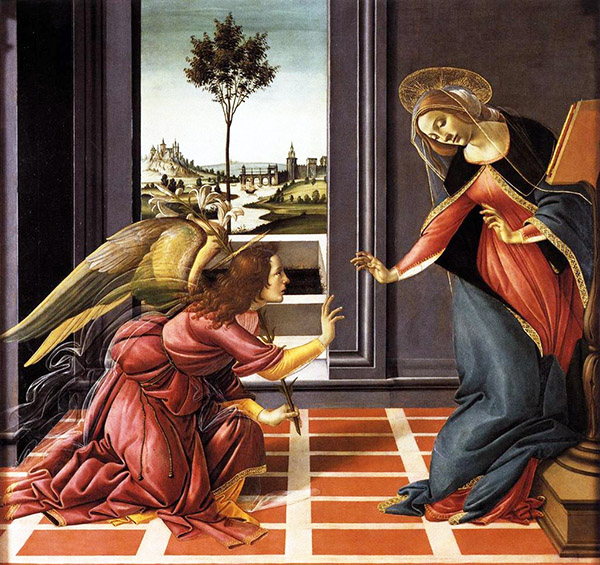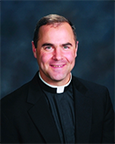Mary's Question
- FATHER PAUL SCALIA
Now here is a curious thing. The Blessed Virgin Mary—the epitome of humility, faith, and obedience—does something that we do not typically associate with those virtues.
 Annunciation by Sandro Botticelli, Public domain, via Wikimedia Commons.
Annunciation by Sandro Botticelli, Public domain, via Wikimedia Commons.
She asks a question: "How can this be, since I have no relations with a man?" Of course, the whole point is that she asks the question in all humility, faith, and obedience. In so doing, she teaches us how to question and, thus, how to think properly about our faith.
And we have to think about our faith. Not to do so would be a disservice to the faith itself. God's revelation is addressed to rational creatures and must be received and responded to by such. Jesus Christ, the fullness of God's revelation, is the Logos—the word, idea, and or thought—made flesh. God is our "reasonable worship." (Romans 12:1) The failure to think warps and distorts the Catholic faith. It begets a superficial, superstitious, and brittle faith, apt to be shattered the first time someone asks a good question.
Unthinking faithful become easy prey. They are the seed along the path: "When anyone hears the word of the kingdom and does not understand it, the evil one comes and snatches away what is sown in his heart." (Matthew 13:19) An unthinking magisterium becomes tyrannical, not teaching God's word authoritatively but just imposing its own power.
Now, to appreciate our Lady's question, we have to contrast it with Zechariah's question from earlier in Luke's Gospel. (cf. Luke 1:5-23) The angel Gabriel appeared to him in the temple. Standing at the altar, he announced the answer to Zechariah's prayers, the birth of John the Baptist. In response, Zechariah asked, "How am I to know this?" At first glance, his question seems similar, practically the same, as Mary's. But the difference is profound.
How am I to know this? Well, God's messenger is standing in front of you. That should be evidence enough. If God's sending of an angel isn't enough, what will be? In modern terms, Zechariah's question would be something to the effect of "Yeah, right" or "Oh, yeah? Prove it." He is not receptive to the truth being announced to him. Rather, he insists that God prove Himself. Zechariah is a skeptic, not seeking to conform his mind to reality but insisting that reality prove itself to his liking. Which makes Zechariah an apt image of most modern thinkers.
Mary's question is different. "How can this be?" could be translated How shall this be? or even How is this going to be? Point is, she accepts that what the angel said will be. But she also wants to know how. Mary first trusted—she had faith—that God's messenger spoke the truth. Then, she wanted to understand how such a miraculous thing would occur.
So, this is the first lesson our Lady teaches us about thinking: to ask questions in faith. Theology is defined as Faith seeking understanding. First, we believe what God has revealed; then we seek to understand it more. We don't make our own understanding the condition of faith. We don't say, "Once you convince me, then I'll believe." That's what Zechariah did—and was punished. Faith in what God has revealed is necessary for the proper kind of thinking in the Church.
Indeed, faith is necessary for any kind of thought. Every teacher understands this because what their students need first is to trust them. If the student doesn't have this natural kind of faith, if he refuses to trust, then he will never be able to receive what the teacher has to impart. The bumper sticker exhorts us: "Question Authority!" That is the narrow mantra of those who refuse to be taught and will therefore never learn to think.
Second, Mary shows that we should ask questions with the willingness to receive the answer. Zechariah's question was the only answer he wanted. Our Lady's question shows an openness to instruction. Here it's good to recall Newman's line that "Ten thousand difficulties do not make one doubt." A difficulty is a puzzlement or wonder about some aspect of the faith. It leads to that questioning and willingness to receive what God has to say.
A doubt comes from and leads to skepticism. It puts God on trial and demands that He prove himself. The irony is that God has done many things to prove His love for us. But we are not open to His answers. We keep moving the goalposts on Him, insisting that He prove Himself on our terms.
Third, Mary shows us that our questions should be for the purpose of self-giving. Her questioning is not just an intellectual endeavor for her. She's not asking just because, you know, it would be nice to know. She doesn't suffer the vice of curiositas. Rather, she asks, she seeks to understand more, so that she can conform herself to God's truth. That is why we should ask questions about the faith: so that by understanding more we can give ourselves more.
Zechariah was punished by being struck mute—because skeptics really have nothing to say. Mary is rewarded by an explanation and by a proof. She didn't demand them; God in His generosity gave them. He doesn't always respond that quickly or that clearly. But He always rewards those who seek Him with sincere and upright hearts, who desire to know and understand Him more, not on their own terms but as He is.
 I hope you appreciated this piece. Before you move on, please consider taking the step of supporting CERC's mission with just $3.
I hope you appreciated this piece. Before you move on, please consider taking the step of supporting CERC's mission with just $3.
When you Google the answer to a question about faith and morals or current events in the Church, you often have to wade through dozens of misleading secular articles before finding a reliable source. CERC will give you faithful, reliable, well-reasoned answers to your questions—with just one click.
CERC is entirely reader supported. Around the world, readers can access CERC's free resources because of people like you. You give us the ability to provide the truth unfettered by algorithm censorship and secular-favored rankings.
Please consider supporting us just once with $3, or better yet, become a Guardian of Truth and support us every month with a little more. Thank you.
J. Fraser Field
Founder of CERC

Acknowledgement
 Father Paul Scalia. "Mary's Question." The Catholic Thing (December 24, 2023).
Father Paul Scalia. "Mary's Question." The Catholic Thing (December 24, 2023).
Reprinted with permission from The Catholic Thing.
The Author
Fr. Paul Scalia is a priest of the Diocese of Arlington, VA, where he serves as Episcopal Vicar for Clergy and Pastor of Saint James in Falls Church. He is the author of That Nothing May Be Lost: Reflections on Catholic Doctrine and Devotion and the editor of Sermons in Times of Crisis: Twelve Homilies to Stir Your Soul.
Copyright © 2023


